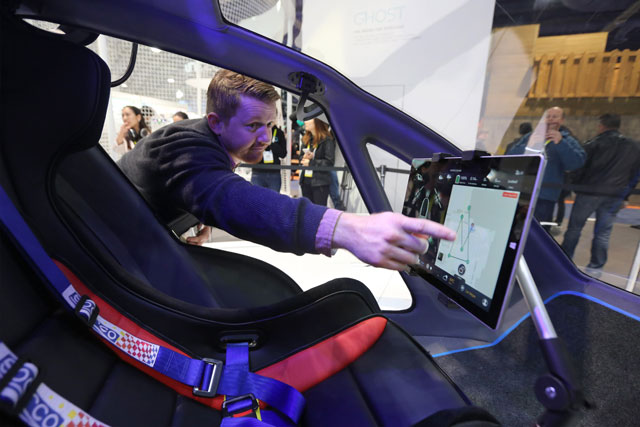
Ford, General Motors and Volkswagen have made it clear they are betting on electric vehicles for the future, even though the segment is only a small sliver of the global industry.
Some of the vehicles unveiled at the Consumers Electronics Show have been concepts or prototypes, but GM displayed the final version of its Chevrolet Bolt, which aims to capture buyers who are interested in electric propulsion without the price tag of a Tesla.
The boldest statement however came from California startup Faraday Future, which on Monday in Las Vegas unveiled its FFZERO1 concept car, resembling a Batmobile and touted as a game-changer in the industry.
The company, which has revealed little about its financial backing or management, has already said it would invest $1 billion in a Nevada manufacturing plant and that it expects cars to be produced within two years.
Volkswagen used CES to unveil its BUDD-e — a version of its hippie favourite Kombi minivan transformed into an electric, connected vehicle of the future.
The German automaker, hit by a global scandal over its diesel cars, said it expects the electric ones to be on the road by the end of the decade. Ron Montoya of the auto research firm Edmunds.com, said VW has a possible winner with the minibus.
"You can easily see that being a production car," he said. "Not only would it be a very stylish car that a lot of people have emotional connections with, but it could be potentially one of the first (electric) minivans."
In a move that could make electric cars affordable to a mass market, GM showed its definitive version of the Chevrolet Bolt and confirmed it would be in production later this year. The Bolt is designed to travel 320 kilometres (200 miles) between charges. And it will cost under $30,000 after tax breaks, GM said.
It also features some of the connected technology found on rival vehicles including a Wi-Fi hotspot offering access to apps and services. "The Bolt EV is truly the first EV that cracks the code of long range and affordable price," GM chief executive Mary Barra told a CES forum.
Ford meanwhile reaffirmed its plan to invest $3.5 billion over the next five years in electric car development, with a goal of producing 13 new EV or hybrid vehicles by 2020.
Several other automakers are also committed to electric, and some see the segment gaining traction, even though electrics only represented 0.08 per cent of the global auto fleet at the end of 2014.
There are signs consumers are warming to EVs. In Norway, for example, one out of every five cars registered last year was electric. "EVs will play a bigger role in the automotive future — there's little question about that," said Kelley Blue Book analyst Akshay Anand.
"The Bolt is a big step simply because of its price and range." Anand said there is still some reluctance, however. Lower fuel prices have reduced the sense of urgency and "most consumers want an EV as a primary vehicle, so range and charging time are critical factors.
One company that has had success in some respects is Tesla, whose highly regarded electric vehicles have become a hit. But its price tag has been too high for the general public.
Faraday Future and others have hinted about a new ownership model, raising the prospect of plans that allow consumers to get a car as needed without a hefty commitment.
This takes on a new perspective if cars become autonomous. "VW hinted that cars might become 'devices' at some point in the future," Anand said. "The social aspect of a car is bizarre to think about, but it could very well happen down the road."









1730884134-0/BeFunky-collage-(26)1730884134-0-270x192.webp)







COMMENTS
Comments are moderated and generally will be posted if they are on-topic and not abusive.
For more information, please see our Comments FAQ